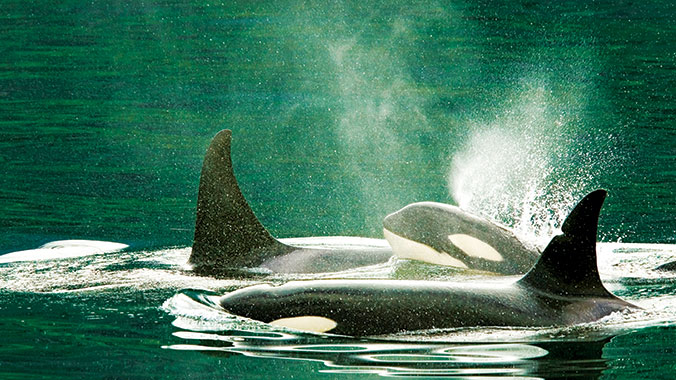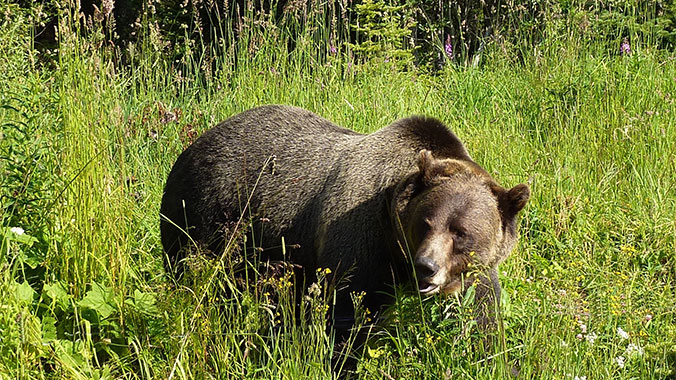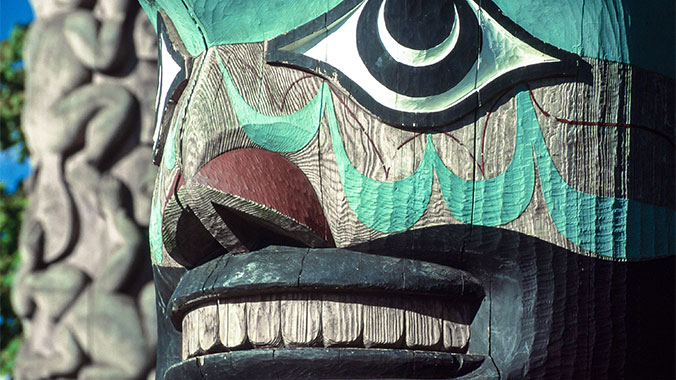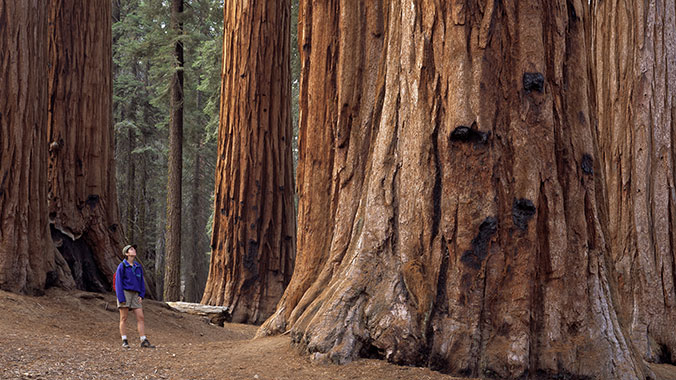British Columbia
Wildlife of British Columbia: Whales, Grizzlies and Ancient Forests
Program No. 21819RJ
Explore mountains, coastal estuaries, wild beaches and a northern rainforest as you learn about British Columbia and the First Nations people who have long called it home.
Itinerary
While we make every effort to ensure the accuracy of our published materials, programs are typically advertised more than a year prior to their start date.
Read More.
While we make every effort to ensure the accuracy of our published materials, programs are typically advertised more than a year prior to their start date. As a result, some program activities, schedules, accommodations, personnel, and other logistics occasionally change due to local conditions or circumstances. Should a major change occur, we will make every effort to alert you. For less significant changes, we will update you during orientation. Thank you for your understanding.
Duration
8 days
7 nights
What's Included
19 meals (
7B, 6L, 6D
)
2 expert-led lectures
9 expert-led field trips
An experienced Group Leader
7 nights of accommodations
Taxes and customary gratuity
Road Scholar Assurance Plan
Day
1
Check-in, Registration, Welcome Dinner, Orientation
Location:
Vancouver, British Columbia
Meals:
D
Stay:
Blue Horizon Hotel
Activity Note
Hotel check-in available from 3:00 p.m. Remember to bring your nametag (sent previously).
Afternoon:
Program Registration: 4:00 p.m. After you have your room assignment, join us at the Road Scholar table in the lobby to register with the program staff, get any updated information, and confirm the time and location of the Orientation session. If you arrive late, please locate your Group Leader and let them know you have arrived.
Dinner:
At the hotel.
Evening:
Orientation: 7:15 p.m. The Group Leader will greet everyone and lead introductions. We will review the up-to-date program schedule, discuss roles and responsibilities, logistics, safety guidelines, emergency procedures, and answer questions. We will learn from a series of local experts who will give lectures and lead field trips. Program-related travel and transfers will be via private motorcoach unless noted otherwise. Periods in the schedule designated as “Free time” and “At leisure” offer opportunities to do what you like and make your experience even more meaningful and memorable according to your personal preferences. The Group Leader will be happy to offer suggestions. Program activities, schedules, personnel, and indicated distances or times may change due to local circumstances/conditions. In the event of changes, we will alert you as quickly as possible. Thank you for your understanding.
Day
2
Presentation, Vancouver Aquarium, Ferry to Nanaimo
Location:
Nanaimo, British Columbia
Meals:
B,L,D
Stay:
Coast Bastion
Activity Note
Walking about 2 miles, approximately 2 hours; city streets, pavement and museum. Getting on/off a motorcoach; driving about 72 miles, approximately 3.5 hours riding time including 1.5-hour ferry crossing.
Breakfast:
At the hotel.
Morning:
A local resident expert will join us to offer a unique insider’s perspective on British Columbia’s coast and the marine life within it. This area is a significant natural corridor where the ocean and land rely on each other and work together in fascinating and crucial ways. We will be educated on the significance of the unique waters to the area, from how the forest ecosystem relies on the salmon for survival, to how the First Nations depend on the water for well-being, to how the fishing and tourism industries of the area depend on this crucial resource. After we will travel to the Vancouver Aquarium to explore Canada’s largest aquarium, one dedicated to the exploration and conservation of aquatic life. During this self-directed field trip, we’ll have the opportunity to see 120 exhibits, including the Pacific Canada Pavilion, and will learn about the ecosystems of the Pacific and other waters and Canada’s dedication to protect them. We’ll have the opportunity to get up close to crabs, sea cucumbers, sea stars and many more. Through these engaging exhibits, we will be immersed in the conservation efforts within Canada, which promises to provide a deep understanding of marine environments and their significance while engaging directly with the creatures being protected.
Lunch:
At a local restaurant..
Afternoon:
Board the ferry to Vancouver Island, the largest island on the west coast of North America, separated from the Canadian mainland by the Georgia Strait, Johnstone Strait, and Queen Charlotte Strait.
Dinner:
At the hotel..
Evening:
At leisure.
Day
3
Cathedral Grove, North Island Recovery Centre
Location:
Nanaimo, British Columbia
Meals:
B,L
Stay:
Coast Bastion
Activity Note
Walking about 2 miles on pavement; some standing at Recovery Centre.
Breakfast:
At the hotel.
Morning:
We start our day by boarding the coach and heading to Cathedral Grove where we will discover the unique MacMillan Park, an unparalleled experience in British Columbia's coastal forest. We’ll explore the trails beneath 800 year old Douglas fir trees, and learn how they protect the astounding ecosystem of the forest. The aftermath of a 1997 windstorm adds to the park's growth and beauty, with fallen trees enriching the ecosystem and nurturing new life. This remarkable environment offers a rare opportunity to immerse yourself in the rich biodiversity and ecological significance that makes this area unique.
Lunch:
In a scenic area.
Afternoon:
We will visit North Island Wildlife Recovery Centre, which offers a unique experience to learn about the rescue and rehabilitation of injured wildlife In British Columbia. We will embark on an immersive experience, and be educated not only on the significance of animal life in Canada, but also on the environmental issues so important to this province and how the conservation of wildlife contributes to the restoration of the area. Explore educational demonstrations as well as active exhibits that provide a unique, hands-on learning experience.
Dinner:
This meal has been excluded from the program cost and is on your own to enjoy local cuisine. The Group Leader will be happy to offer suggestions.
Evening:
At leisure. Prepare for early check-out and transfer in the morning.
Day
4
Campbell River Museum, Telegraph Cove
Location:
Telegraph Cove, British Columbia
Meals:
B,L,D
Stay:
Telegraph Cove Resort
Activity Note
Getting on and off motor coach; Driving from Nanaimo to Telegraph Cove is approx. 220 miles; about 4 hours. Walking up to 1 mile. Some standing st the museum.
Breakfast:
Early morning breakfast at the hotel.
Morning:
We will check out and depart by motorcoach, travelling to our destination of Telegraph Cove. Keep your eyes out for local wildlife as we pass through forests, small towns, and coastlines that wind in and away from the road. At the Campbell River Museum, take a fascinating journey into Vancouver Island's rich history. Through engaging exhibits, we will discover the traditions of First Nations, the world of logging, and the evolution of salmon fishing that shaped British Columbia. A local resident expert will bring this history to life, revealing the cultural and economic impact on the region, and the fascinating complex past of the area.
Lunch:
At a local restaurant..
Afternoon:
We’ll continue our journey to Telegraph Cove, tucked away on the eastern coast of Northern Vancouver Island in one of the last virtually untouched areas of the North American continent. This tiny sawmill and cannery community was important to the development of the North Island and has a rich and colorful history and is one of the last boardwalk communities of eastern Vancouver Island. We’ll then check in at the hotel before dinner.
Dinner:
At a restaurant in Telegraph Cove.
Evening:
At leisure.
Day
5
Whale Museum, Ferry to Alert Bay, U'mista Cultural Centre
Location:
Telegraph Cove, British Columbia
Meals:
B,L,D
Stay:
Telegraph Cove Resort
Activity Note
Walking about 1 mile; about 1.5 hours; gravel paths and grassy areas. Getting on/off a ferry; crossing to Alert Bay is about 7.5 nautical miles, less than 1 hour (each way). Driving about 4 hours total.
Breakfast:
At the hotel.
Morning:
We will walk to the Whale Interpretive Centre in Telegraph Cove for an expert-led exploration. The waters between Vancouver Island and mainland British Columbia are home to magnificent orcas (killer whales) from early July through October. These protected waters are an ideal location to view and listen to orcas and other marine mammals as they feed, socialize, and raise their young. The center therefore, thanks to its location, is home to one of the best collections of marine mammal skeletons in British Columbia including those of whales, dolphins, porpoises and seals. The center was established to provide public awareness about the biology of marine mammals as well as about the biology, habitat needs and threats posed to local marine mammals. Then we will board a ferry for Alert Bay.
Lunch:
At a local restaurant.
Afternoon:
Arriving in Alert Bay, we will visit the U'Mista Cultural Centre and learn from a local First Nations’ member about their traditions and how to interpret totem pole burial grounds on an expert-led exploration. The centre’s mission is to ensure the survival of all aspects of cultural heritage of the Kwakwaka'wakw peoples. Afterwards, there will be time for self-led exploration of the museum, totem poles and big house.
Dinner:
At a local restaurant in Telegraph Cove.
Evening:
At leisure.
Day
6
Grizzly Bear Field Trip by Boat
Location:
Telegraph Cove, British Columbia
Meals:
B,L,D
Stay:
Telegraph Cove Resort
Activity Note
Getting on/off 12-passenger aluminum boats; cruising approximately 2 hours each way; vessels are covered and have onboard toilets. Dress warmly in dark layers with a waterproof shell; bring a hat and a water bottle. No perfume/aftershave/scents. We will always stay at least 150 feet from bears.
Breakfast:
On the boat.
Morning:
After boarding aluminum water taxis at the dock, we’ll continue traveling toward Knight Inlet, due north of Johnstone Strait and Telegraph Cove, for our exciting bear and wildlife spotting adventure. Once we reach a bear viewing hot spot, we will transfer to large flat-bottom viewing skiffs, which have an elevated platform on the bow as well as a crow’s nest up above for the bear viewing. These are former herring fishing boats that have been modified for wildlife viewing in shallow estuaries. Their shallow draught serves to get us in close to the action. Knight Inlet, a prime black bear and grizzly bear habitat, cuts 80 miles through the remote Coast Range of mountains to Mount Waddington, the highest mountain in British Columbia. Under expert leadership, we will explore the hidden habitat of bears, learn about the ecosystem and discover how bears play an integral role in sustaining the bioregion. Bald eagles, orcas and other wildlife are abundant, and the river system supports a phenomenal fall salmon run. Needless to say, the opportunities for nature photography in Knight Inlet are superb. As a courtesy to the bears and to ensure the longevity of viewing for years to come, we will always stay at least 50 meters from bears as per recommended guidelines; please do not wear perfumes or aftershave on the bear viewing trip.
Lunch:
On the float back away from the bear viewing area, we will enjoy a spread. Eating in the bear viewing area is not bear friendly; we cannot have these bears associating the smell of people with the smell of human food.
Afternoon:
Our west coast grizzly bear adventure will continue amid great towering mountains rising out of the sea, cascading waterfalls, and waterslides. While our local experts will make their best effort to get us to the best places for bear viewing, they cannot guarantee sightings – they would like to be able to book an appointment with the bears but sometimes they do not show up!
Dinner:
At a local restaurant.
Evening:
At the hotel, a local expert will deliver an evening presentation on marine life. We’ll learn about the biodiversity and remarkable adaptations invertebrates and fish of the NE Pacific Ocean have. It is always surprising to discover how little we know about these marine mammals. The primary focus, however, will be on orca and humpback whale research as we discuss the life-sustaining value of the NE Pacific, conservation concerns (includes Sea Star Wasting Syndrome), and solutions. Prepare for check-out and transfer in the morning.
Day
7
Whale Watching, Coach to Nanaimo
Location:
Nanaimo, British Columbia
Meals:
B,L,D
Stay:
Coast Bastion
Activity Note
Walking about 1 mile over the course of the day; pavement and boardwalks. Getting on/off the boat; whale watching is approximately 4 hours, with varying distance based on location of sightings; vessels carry up to 74 passengers. Heated indoor cabin, two open-air decks, onboard washrooms and snack bar. Bring a light jacket or rain gear. Hats, gloves, and jackets provided for all passengers on request. Getting on/off a motorcoach; driving about 221 miles, approximately 4.5 hours riding time.
Breakfast:
At the hotel.
Morning:
From Telegraph Cove, we’ll embark on a whale watching study cruise in the “whale watching capital” of British Columbia. In addition to whales, there is a great diversity and abundance of marine life in local waters. The cold, oxygen- and nutrient-rich waters fuel one of the most vibrant ecosystems on earth. While orcas are the primary viewing experience, we may also encounter humpback whales, Dalls porpoises, Pacific white-sided dolphins, and occasionally Harbour seals and Steller sea lions. To enhance our field trip, the boats are equipped with underwater microphones (hydrophones) so we can listen in on the squeaks, whistles, and echolocation that allow orcas and dolphins the ability to communicate and locate their food. The boat has a range of educational materials from ID catalogues to maps, charts, and books on the local area and marine life. The captain and crew will be happy to answer questions.
Lunch:
At a restaurant in Telegraph Cove.
Afternoon:
We will board the motorcoach and travel south on Vancouver Island to Nanaimo, with some stops along the way.
Dinner:
At the hotel in Nanaimo. Share favorite experiences and enjoy camaraderie with new Road Scholar friends during our farewell dinner.
Evening:
At leisure. Prepare for check-out and departure in the morning.
Day
8
Ferry to Vancouver, Program Concludes
Location:
Nanaimo, British Columbia
Meals:
B
Activity Note
Early morning hotel check-out. Getting on/off a ferry; crossing from Nanaimo to Vancouver is about 30 nautical miles, approximately 1.5 hours. Arrival to the Vancouver Airport approximately 12:00 Noon.
Breakfast:
At the hotel.
Morning:
After breakfast we will make our way to the ferry. Once we reach the dock, we’ll get off the ferry, and board a motorcoach for transfer to Vancouver Airport, expected arrival around 12:00 noon. If you are departing, please plan flights accordingly. This concludes our program. If you are returning home, safe travels. If you are staying on independently, have a wonderful time. If you are transferring to another Road Scholar program, detailed instructions are included in your Information Packet for that program. We hope you enjoy Road Scholar learning adventures and look forward to having you on rewarding programs in the future. Don’t forget to join our Facebook page and follow us on Instagram. Best wishes for all your journeys!
Please select a day to update the map
Map details are not available for this location.




